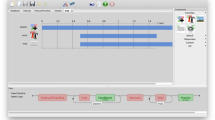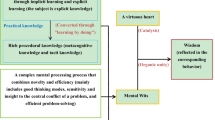Abstract
Metacognition refers to the ability of an organism to evaluate its states of knowledge (metacognitive monitoring) and engage in appropriate information-seeking behaviors when a lack of knowledge is detected (metacognitive control). This study assessed metacognitive monitoring and control in three Guinea baboons (Papio papio). Monkeys were required to report on a touchscreen the location of two target stimuli that had previously appeared briefly on a grid. They could either respond directly or use a “Repeat” key providing an opportunity to repeat the target stimuli. In Experiment 1, the baboons used the Repeat key more frequently in difficult trials and transferred this use of the key to novel conditions. Two baboons showed higher accuracy when they declined using the key compared to Baseline trials in which the key was not available, suggesting accurate metacognitive monitoring judgments. The same two baboons were consistently faster at reporting the targets’ locations after a repetition of the stimulus. In Experiment 2, the baboons had to choose between two Repeat keys, one for each target. Two baboons showed a preference for repeating the presentation of the less visible target, suggesting that they identified what information they lack. Overall, results support the hypothesis of metacognitive monitoring in baboons, and also provide limited evidence for metacognitive control. We propose that tests requiring subjects to choose between several metacognitive responses in computerized tasks provide a suitable new approach for studying targeted information-seeking behaviors in animals.






Similar content being viewed by others
References
Basile BM, Hampton RR (2011) Monkeys recall and reproduce simple shapes from memory. Curr Biol 21:774–778. doi:10.1016/j.cub.2011.03.044
Basile BM, Hampton RR, Suomi SJ, Murray EA (2009) An assessment of memory awareness in tufted capuchin monkeys (Cebus apella). Anim Cogn 12:169–180. doi:10.1007/s10071-008-0180-1
Basile BM, Schroeder GR, Brown EK, Templer VL, Hampton RR (2015) Evaluation of seven hypotheses for metamemory performance in rhesus monkeys. J Exp Psychol Gen 144:85–102. doi:10.1037/xge0000031
Beran MJ, Smith JD (2011) Information seeking by rhesus monkeys (Macaca mulatta) and capuchin monkeys (Cebus apella). Cognition 120:90–105. doi:10.1016/j.cognition.2011.02.016
Beran MJ, David J, Redford JS, Washburn DA (2006) Rhesus macaques (macaca mulatta) monitor uncertainty during numerosity judgments. J Exp Psychol Anim Behav Process 32:111–119. doi:10.1037/0097-7403.32.2.111
Beran MJ, Smith JD, Coutinho MVC et al (2009) The psychological organization of “uncertainty” responses and “middle” responses: a dissociation in capuchin monkeys (Cebus apella). J Exp Psychol Anim Behav Process 35:371–381. doi:10.1037/a0014626
Beran MJ, Smith JD, Perdue BM (2013) Language-trained chimpanzees (Pan troglodytes) name what they have seen but look first at what they have not seen. Psychol Sci 24:660–666. doi:10.1177/0956797612458936
Beran MJ, Perdue BM, Smith JD (2014) What are my chances? Closing the gap in uncertainty monitoring between rhesus monkeys (Macaca mulatta) and capuchin monkeys (Cebus apella). J Exp Psychol Anim Learn Cogn 40:303–316. doi:10.1037/xan0000020
Call J (2010) Do apes know that they could be wrong? Anim Cogn 13:689–700. doi:10.1007/s10071-010-0317-x
Call J (2012) Seeking information in non-human animals: weaving a metacognitive web. In: Beran MJ, Brandl J, Perner J, Proust J (eds) Foundations of Metacognition. Oxford University Press, Oxford, pp 62–75
Call J, Carpenter M (2001) Do apes and children know what they have seen? Anim Cogn 3:207–220. doi:10.1007/s100710100078
Carruthers P (2008) Meta-cognition in animals: a skeptical look. Mind Lang 23:58–89. doi:10.1111/j.1468-0017.2007.00329.x
Carruthers P, Ritchie JB (2012) The emergence of metacognition: affect and uncertainty in animals. In: Beran MJ, Brandl J, Perner J, Proust J (eds) Foundations of metacognition. Oxford University Press, Oxford, pp 76–93
Couchman JJ, Coutinho MVC, Beran MJ, Smith JD (2010) Beyond stimulus cues and reinforcement signals: a new approach to animal metacognition. J Comp Psychol Wash DC 124:356–368. doi:10.1037/a0020129
Crystal JD, Foote AL (2009) Metacognition in animals: trends and challenges. Comp Cogn Amp Behav Rev. doi:10.3819/ccbr.2009.40005
Crystal JD, Foote AL (2011) Evaluating information-seeking approaches to metacognition. Curr Zool 57:531–542
Dokic J (2012) Seeds of self-knowledge: noetic feelings and metacognition. In: Beran MJ, Brandl J, Perner J, Proust J (eds) Foundations of Metacognition. Oxford University Press, Oxford, pp 302–321
Fagot J, Bonté E (2010) Automated testing of cognitive performance in monkeys: use of a battery of computerized test systems by a troop of semi-free-ranging baboons (Papio papio). Behav Res Methods 42:507–516. doi:10.3758/BRM.42.2.507
Fagot J, De Lillo C (2011) A comparative study of working memory: immediate serial spatial recall in baboons (Papio papio) and humans. Neuropsychologia 49:3870–3880. doi:10.1016/j.neuropsychologia.2011.10.003
Fagot J, Paleressompoulle D (2009) Automatic testing of cognitive performance in baboons maintained in social groups. Behav Res Methods 41:396–404. doi:10.3758/BRM.41.2.396
Flavell JH (1979) Metacognition and cognitive monitoring: a new area of cognitive–developmental inquiry. Am Psychol 34:906–911. doi:10.1037/0003-066X.34.10.906
Foote AL, Crystal JD (2007) Metacognition in the rat. Curr Biol CB 17:551–555. doi:10.1016/j.cub.2007.01.061
Foote AL, Crystal JD (2012) “Play it Again”: a new method for testing metacognition in animals. Anim Cogn 187:187–199. doi:10.1007/s10071-011-0445-y
Fujita K (2009) Metamemory in tufted capuchin monkeys (Cebus apella). Anim Cogn 12:575–585. doi:10.1007/s10071-009-0217-0
Hampton RR (2001) Rhesus monkeys know when they remember. Proc Natl Acad Sci 98:5359–5362. doi:10.1073/pnas.071600998
Hampton RR (2005) Can rhesus monkeys discriminate between remembering and forgetting? The missing link in cognition: origins of self-reflective consciousness. Oxford University Press, Oxford
Hampton RR (2009) Multiple demonstrations of metacognition in nonhumans: converging evidence or multiple mechanisms? Comp Cogn Behav Rev 4:17–28
Hampton RR, Zivin A, Murray EA (2004) Rhesus monkeys (Macaca mulatta) discriminate between knowing and not knowing and collect information as needed before acting. Anim Cogn 7:239–246. doi:10.1007/s10071-004-0215-1
Koriat A (2000) The feeling of knowing: some metatheoretical implications for consciousness and control. Conscious Cogn 9:149–171. doi:10.1006/ccog.2000.0433
Koriat A, Levy-Sadot R (1999) Processes underlying metacognitive judgments: information-based and experience-based monitoring of one’s own knowledge. In: Chaiken S, Trope Y (eds) Dual-process theories in social psychology. Guilford Press, New York, pp 483–502
Koriat A, Levy-Sadot R (2001) The combined contributions of the cue-familiarity and accessibility heuristics to feelings of knowing. J Exp Psychol Learn Mem Cogn 27:34–53. doi:10.1037//0278-7393.27.1.34
Kornell N (2014) Where is the “meta” in animal metacognition? J Comp Psychol Wash DC 1983(128):143–149. doi:10.1037/a0033444
Kornell N, Son LK, Terrace HS (2007) Transfer of metacognitive skills and hint seeking in monkeys. Psychol Sci 18:64–71. doi:10.1111/j.1467-9280.2007.01850.x
Krachun C, Call J, Tomasello M (2009) Can chimpanzees (Pan Troglodytes) discriminate appearance from reality? Cognition 112:435–450
Le Pelley ME (2012) Metacognitive monkeys or associative animals? Simple reinforcement learning explains uncertainty in nonhuman animals. J Exp Psychol Learn Mem Cogn 38:686–708. doi:10.1037/a0026478
Marsh HL, MacDonald SE (2012a) Orangutans (Pongo abelii) “play the odds”: information-seeking strategies in relation to cost, risk, and benefit. J Comp Psychol 126:263–278. doi:10.1037/a0025906
Marsh HL, MacDonald SE (2012b) Information seeking by orangutans: a generalized search strategy? Anim Cogn 15:293–304. doi:10.1007/s10071-011-0453-y
Metcalfe J, Son LK (2012) Anoetic, noetic, and autonoetic metacognition. In: Beran MJ, Brandl J, Perner J, Proust J (eds) Foundations of metacognition. Oxford University Press, Oxford, pp 289–301
Neldner K, Collier-Baker E, Nielsen M (2015) Chimpanzees (Pan troglodytes) and human children (Homo sapiens) know when they are ignorant about the location of food. Anim Cogn 18:683–699. doi:10.1007/s10071-015-0836-6
Nelson TO (1990) Metamemory: a theoretical framework and new findings. In: Bower Gordon H (ed) Psychology of learning and motivation. Academic Press, San Diego, pp 125–173
Paukner A, Anderson JR, Fujita K (2006) Redundant food searches by capuchin monkeys (Cebus apella): a failure of metacognition? Anim Cogn 9:110–117. doi:10.1007/s10071-005-0007-2
Perner J (2012) MiniMeta: in search of minimal criteria for metacognition. In: Beran MJ, Brandl J, Perner J, Proust J (eds) Foundations of metacognition. Oxford University Press, Oxford, pp 94–116
Proust J (2013) The philosophy of metacognition: mental agency and self-awareness. Oxford University Press, Oxford
Roberts WA, Feeney MC, McMillan N et al (2009) Do pigeons (Columba livia) study for a test? J Exp Psychol Anim Behav Process 35:129–142. doi:10.1037/a0013722
Roberts W, McMillan N, Musolino E, Cole M (2012) Information seeking in animals: metacognition? Comp Cogn Behav Rev 8:85–109. doi:10.3819/ccbr.2012.70005
Schunn CD, Reder LM, Nhouyvanisvong A et al (1997) To calculate or not to calculate: a source activation confusion model of problem familiarity’s role in strategy selection. J Exp Psychol Learn Mem Cogn 23:3
Schwartz BL, Metcalfe J (1992) Cue familiarity but not target retrievability enhances feeling-of-knowing judgments. J Exp Psychol Learn Mem Cogn 18:1074–1083. doi:10.1037/0278-7393.18.5.1074
Smith JD (2009) The study of animal metacognition. Trends Cogn Sci 13:389–396. doi:10.1016/j.tics.2009.06.009
Smith JD, Schull J, Strote J et al (1995) The uncertain response in the bottlenosed dolphin (Tursiops truncatus). J Exp Psychol Gen 124:391–408
Smith JD, Beran MJ, Redford JS, Washburn DA (2006) Dissociating uncertainty responses and reinforcement signals in the comparative study of uncertainty monitoring. J Exp Psychol Gen 135:282–297. doi:10.1037/0096-3445.135.2.282
Smith JD, Beran MJ, Couchman JJ, Coutinho MVC, Boomer JB (2009) The curious incident of the capuchins. Comp Cogn Behav Rev. doi:10.3819/ccbr.2009.40008
Smith JD, Couchman JJ, Beran MJ (2012) The highs and lows of theoretical interpretation in animal-metacognition research. Philos Trans R Soc B Biol Sci 367:1297–1309. doi:10.1098/rstb.2011.0366
Smith JD, Coutinho MVC, Church BA, Beran MJ (2013) Executive-attentional uncertainty responses by rhesus macaques (Macaca mulatta). J Exp Psychol Gen 142:458–475
Son LK, Kornell N (2005) Meta-confidence judgments in rhesus macaques: explicit versus implicit mechanisms. In: Terrace HS, Metcalfe J (eds) The missing link in cognition: origins of self-reflective consciousness. Oxford University Press, Oxford, pp 296–320
Templer VL, Hampton RR (2012) Rhesus monkeys (Macaca mulatta) show robust evidence for memory awareness across multiple generalization tests. Anim Cogn 15:409–419. doi:10.1007/s10071-011-0468-4
Vining AQ, Marsh HL (2015) Information seeking in capuchins (Cebus apella): a rudimentary form of metacognition? Anim Cogn 18:667–681. doi:10.1007/s10071-015-0835-7
Washburn DA, David J, Shields WE (2006) Rhesus monkeys (macaca mulatta) immediately generalize the uncertain response. J Exp Psychol Anim Behav Process 32:185–189. doi:10.1037/0097-7403.32.2.185
Zakrzewski AC, Perdue BM, Beran MJ et al (2014) Cashing out: the decisional flexibility of uncertainty responses in rhesus macaques (Macaca mulatta) and humans (Homo sapiens). J Exp Psychol Anim Learn Cogn 40:490–501. doi:10.1037/xan0000041
Acknowledgments
The authors acknowledge the financial support from the Federation de Recherche 3C as well as the EU Euprim-Net-II project (#RII3-026155) and ANR Premilang2 project. Technical support from the staff of the CNRS primate research station is also acknowledged. Nicolas Claidière, Joëlle Proust and Jérôme Dokic are gratefully acknowledged for their comments on an early draft.
Author information
Authors and Affiliations
Corresponding author
Ethics declarations
Conflict of interest
The authors declare that they have no conflict of interest.
Ethical standard
This research was carried out in accordance with French standards and received approval from the ethics committee “CE-14” for experimental research with animals.
Electronic supplementary material
Below is the link to the electronic supplementary material.
Rights and permissions
About this article
Cite this article
Malassis, R., Gheusi, G. & Fagot, J. Assessment of metacognitive monitoring and control in baboons (Papio papio). Anim Cogn 18, 1347–1362 (2015). https://doi.org/10.1007/s10071-015-0907-8
Received:
Revised:
Accepted:
Published:
Issue Date:
DOI: https://doi.org/10.1007/s10071-015-0907-8




